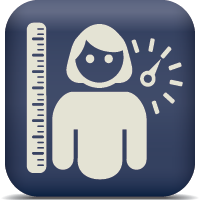Health History is one of the two ways we ask about health information in Genes for Good. These surveys focus on lifelong health, such as whether you've ever had cancer or a heart attack.
Once you've submitted a saliva sample, we extract DNA from your sample and analyze it for associations with the health information you provided in the surveys. Our goal is to find genes associated with different diseases, which helps us understand how genes impact health and behavior. The DNA also allows us to return ancestry information to you.
After you complete each Health History Survey, you can compare selected results for that survey to those of all the other participants in Genes for Good. Join the study, fill out the surveys, and see how you compare.
Here is a snapshot of available questionnaires.
Excessive alcohol use is a risk factor for a variety of conditions, and alcoholism is a serious condition in its own right. Risk for alcohol abuse and alcoholism are clearly influenced by genes, but research to date has only identified a few genes weakly associated with alcohol use and alcoholism. When we learn more about genetic risk, we move closer to developing effective treatment and prevention efforts to help individuals who struggle with addiction.
Many of us know someone who has suffered from cancer. Cancers are genetic mutations gone terribly wrong, so that the new cancerous tissue spreads, often until it is lethal or is successfully treated. Whether you've had cancer or not, your information is extremely valuable to help us understand the causes of cancer and the possibility of prevention and treatment.
The demographics questions help us put your information into context. You are more than a set of numbers. You're an individual from a family, a culture, a society, an ethnicity. Please provide this information so we can understand not just how your genes are associated with health and disease, but how that association might depend on your particular life story.
Smoking and tobacco use run in families. We know that individuals with some genetic variants smoke more than others, but this is only the tip of the iceberg. We need additional research to find more genes that affect tobacco use and nicotine addiction. Armed with this information, we can begin devising treatment and prevention efforts to help the millions of smokers who want to quit smoking.
As you age, exposure to sounds over the years can damage the cells of your inner ear, which leads to hearing loss. Hearing can also be impaired in other ways, by infections, loud music, loud machinery, physical trauma, some medications, and genetic predispositions. Hearing difficulties, or even complete and irreversible hearing loss can have a significant effect on your quality of life. Help us to learn more about hearing impairments by answering this survey.
 Reasoning
Reasoning
This survey will help us learn more about problem-solving and reasoning skills! This task will include items that test logic, vocabulary, and general knowledge.
Arthritis is the inflammation of one or more of your joints, and is characterized by joint pain and stiffness. These symptoms tend to worsen with age. The most common forms of arthritis are osteoarthritis and rheumatoid arthritis. According to 2010-2012 data from the National Health Interview Survey, 52.5 million (or 22.7 %) of adults have self-reported doctor-diagnosed arthritis. By 2030 this number is expected to rise to 67 million (or 25 %) of adults. Studies have shown a genetic link between people who have certain types of arthritis and a family history of arthritis. Whether you have arthritis or not, your information is valuable to help us better understand this disease.
The majority of humans are right-handed: up to 90 % of the world population is more skillful with their right hand. Many are also right-sided in general and prefer to use their right eye, right foot and right ear. However, the side of the dominant eye or foot and the dominant hand do not always match. The reasons a person is right-sided or left-sided are not fully understood and there are several theories of how it develops. Studies have shown that genetic factors influence handedness to a certain extent but it is a complex inheritance pattern. Please take the survey to let us know about your side preferences and help us move this research forward.
Diabetes rates have been increasing steadily for decades. Genes play a clear role in risk for this disease, but developing diabetes also depends greatly on the food we eat and the exercise we get. Disentangling which genes do what, and how those genes' effects depend on one's diet, is a major challenge that requires information on huge numbers of individuals. Genes for Good is a great way to get these large numbers of individuals.
Your natural hair color, hair texture, and skin color are genetically influenced. While ethnicity is often associated with color and curliness, we want to further understand how genes are associated with these traits, regardless of ethnicity or race. Various kinds of skin pigmentation, such as moles, show strong associations with skin cancer. The more moles you have, the higher your risk of developing melanoma, a serious form of skin cancer.
Migraines and other types of headaches are painful. Although much about the cause of migraines isn't understood, genetics appear to play a role. If one or both of your parents have migraines, then you have a good chance of having migraines too. It can be a long and excruciating process for migraine patients to find the right treatment, so please support research to understand the underlying mechanisms, whether or not you suffer from headaches or migraines.
Vision problems run in families. Some eye problems show up in early childhood, while others are associated with aging. Whether or not you have vision problems, your contribution will be valuable in helping to understand prevention and treatment of vision-related illness.
There are a variety of reasons why some people experience fertility problems, such as increased age, prior infections, overexposure to certain chemicals and toxins, or genetic predispositions. Please answer this short survey to help us understand the relationships between genes, environment and fertility.
Eating habits affect your health and risk for certain diseases. Of course, when and what you eat is complicated, and influenced by psychological, social, and genetic factors. If we understand more about the genetics of taste and cravings, we can address the epidemics of diabetes, obesity, and cardiovascular disease.
Allergies and asthma are determined by both genetic and environmental influences. The number of people in the U.S. who have either allergy or asthma symptoms is approximately 1 in 5. There are many different types of allergies: food, insect, seasonal, drug allergies, to name a few. Symptoms can range from slight irritation (for example, itching, watery eyes, swelling of the tongue) to anaphylaxis (a life-threatening reaction). The cause of allergies is still not fully understood; however, studies show that having asthma puts you at higher risk for developing an allergy. You are also at increased risk of allergies if you have family members who have asthma or hay fever. Please fill out this survey to help us grasp this connection between allergies and asthma.
 Patterns
Patterns
In this task we will ask you to view a pattern from which a piece is missing. From the list of options, please select the correct piece to complete the pattern.
Keep in mind that some of the patterns are very difficult; they were designed that way! Think about it: if everyone gets every question right, then the results would be the same for everyone - not very useful for research! We do not expect you to get every single question right. We only ask that you give your best effort.
Heart disease and heart attacks are one of the leading causes of death in the U.S. Some genes have been linked to heart disease risk already, but more research is certainly needed. Your heart history will be a valuable piece to the puzzle.
Weight, or more specifically your Body Mass Index (BMI), is an important risk factor in the development of a large number of diseases. BMI is a measure of your weight that takes into account how tall you are. Individuals with high BMIs are more likely to develop heart disease and diabetes, and they generally have a shorter expected lifespan. The average American BMI has grown in the past few decades to what is now an all-time high. Genes play a clear role in BMI, but much more remains to be known about how the genes that affect BMI may or may not result in increased risk for other disease.
Have you ever taken an online personality survey? Did you wonder if it was scientifically accurate, or just assume it was junk? Well, this survey is a good one, and it's short! We'll even give you your personality profile when you are done.
Psoriasis (sor-EYE-uh-sis) is a chronic, often painful skin disease. It is a complicated immune disorder, and no cure is currently available. Researchers have already identified some genes associated with the condition, but it's still unclear how the genes work together. Please help us learn more about risk factors for psoriasis so that new treatments can be developed.
Whether it is anxiety, sadness, or something else, most people will suffer some kind of psychological hardship at some point in their lives. Depression, anxiety, bipolar disorder, schizophrenia, and essentially all other mental disturbances run in families. Genes certainly play a strong role, and we're only beginning to understand how they affect our mental health.
Gastrointestinal problems can range from uncomfortable to life-threatening. We know that certain genes play a role in determining risk and severity of gastrointestinal problems, but there is a lot we'd still like to discover about the relationships between genetics, environment, and lifestyle. Your information will help us better understand possible causes, prevention, and treatment for gastrointestinal illness.
This survey asks about the characteristics of the homes, streets, and sidewalks in your neighborhood. Are businesses within a walkable distance of your home, and is your neighborhood safe? Physical environments influence physical activity behavior. If you are not able to walk or ride a bike in the neighborhood, you are less likely to engage in these types of physical activity. If you live in a city or a town; please tell us about your neighborhood.
![]() Fitness Tracker (discont'd)
Fitness Tracker (discont'd)
Physical activity has important influences on health. Wearable sensors and other new technologies have been developed to automatically monitor your exercise and other physical activity. In this survey, we will ask a few questions about how you use (or do not use) this technology. We ask because we are interested in developing ways for participants in Genes for Good to share information about their physical activity with the study, so that we can better understand how genes and environment influence activity, and how activity influences health.






















